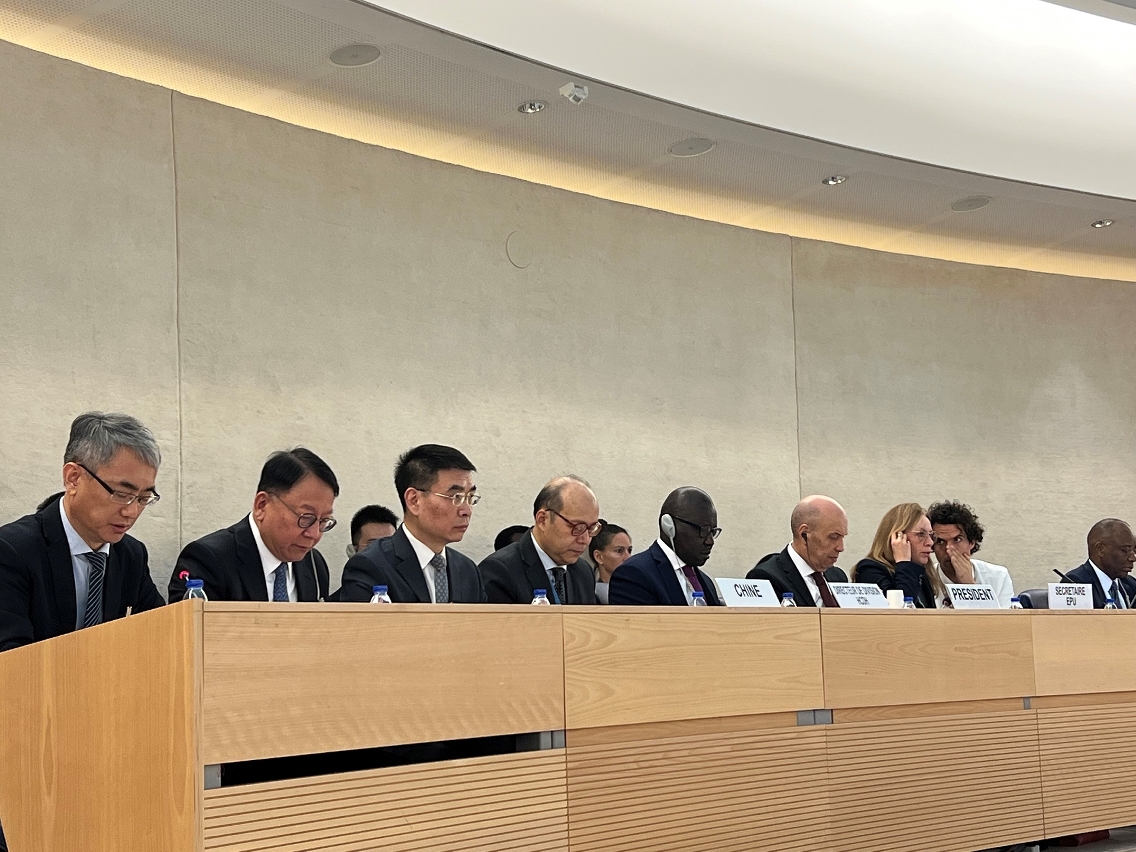 Secretary in Geneva for United Nations Human Rights Council meeting
Secretary in Geneva for United Nations Human Rights Council meeting
The Secretary for Administration and Justice of the Macao Special Administrative Region (MSAR) Government, Mr Cheong Weng Chon, attended a meeting of the United Nations (UN) Human Rights Council, held in relation to its Universal Periodic Review (4th Cycle) of UN Member states, and which covered a report on human rights submitted by China, which includes a section on the MSAR.
Secretary Cheong was present at the meeting on Tuesday (23 January) in Geneva, Switzerland. China’s delegation was led by the Representative of the Permanent Mission of the People’s Republic of China to the United Nations in Geneva, Mr Chen Xu. Mr Cheong is deputy head of the delegation.
In his opening statement at the review meeting, Mr Cheong highlighted some of the progress made by the MSAR in the field of human rights since the 3rd Cycle review in 2018.
The MSAR has been continuously advancing its human rights protection efforts through legislative measures and initiatives. These steps have included: amending the Judicial Organisation Framework Law to enhance judicial efficiency and safeguard the right of residents to access legal remedies; restructuring the Monitoring Committee on Discipline of Public Security Forces, transforming it into an independent external supervisory body with expanded oversight powers; enacting the minimum wage law to ensure a basic income for both local and non-local employees; and implementing a double-tier social security system, including a non-mandatory central provident fund scheme on top of the basic social security foundation.
In addition, to enhance awareness of human rights protection, the MSAR provided human rights training to government officials, judicial officers, teachers, and others. The MSAR Government also collaborated with non-governmental organisations to carry out human rights education activities, said Mr Cheong.
Looking ahead, with the support of the Central Government, the MSAR will fully implement the “One country, two systems” principle and the Basic Law of Macao, accelerating the pace of appropriate economic diversification to ensure long-term prosperity and stability in Macao.
In tandem, the MSAR Government will continue to improve the legal framework related to human rights and better implement international human rights conventions, striving to enhance the level of human rights protection, added Mr Cheong.
During the interactive dialogue session, Mr Cheong took questions and detailed the MSAR Government’s ongoing effort to protect the rights of women, children, persons with disabilities, and minority groups. Continuous effort was being made to enhance local laws to further improve their protection. Steps included: amending the Labour Relations Law to increase the number of maternity leave days; revising the Special Education System to provide more appropriate support to children with special needs; introducing the subsidy scheme to promote employment opportunities for persons with disabilities; and formulating the Regime of Prevention and Control of Underage Alcohol Consumption, to safeguard the physical and mental health of children.
The Secretary stated that the MSAR attached great importance to the opinions and suggestions put forward by human rights treaty bodies. The MSAR Government followed up on the recommendations that were practical and beneficial to the development of the MSAR and the well-being of its residents.
For instance, the MSAR Government had enacted laws such as the Combatting the Crime of Trafficking in Persons; promulgated the Law on Preventing and Combatting Domestic Violence, and established the offence of sexual harassment.
Regarding the protection of the rights of migrant workers, the MSAR has legal provisions in place to ensure that non-resident workers in Macao are not subjected to discrimination. The Law on Employment of Non-Resident Workers establishes the principle of non-discrimination and grants to non-resident workers, rights, obligations, and working conditions that are no less favourable than those of local employees.
The review meeting is scheduled to adopt its report on 26 January and submit it to a plenary session of the Human Rights Council for approval in due course.


